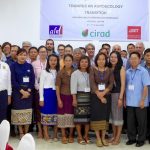
38 downloads
Title of document: Proceeding of the National Workshop on Agroecology Transition in Lao PDR Authors: Pierre Ferrand and Dr. Saythong Vilayvong Ministry/Government Agency/Organisation: ALiSEA Year of publication: 2016 Geographic focus: Laos Url original document: Summary: This report presents the main findings of the discussions held during the 2 days workshop addressing the agroecology transition in Vientiane, Laos on the 2nd and 3rd of June 2016. Read More
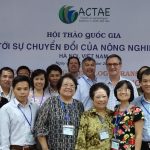
22 downloads
Title of document: Proceeding of the National Workshop on Agroecology Transition in Vietnam Authors: Dr. Htet Kyu and Pierre Ferrand Ministry/Government Agency/Organisation: ALiSEA Year of publication: 2016 Geographic focus: Vietnam Url original document: Summary: This report presents the main findings of the discussions held during the 2 days workshop addressing the agroecology transition in Hanoi, Vietnam on the 5th and 6th of May 2016. Read More
6 downloads
Title of document: Study of farmer experiences and approaches with mechanised dry direct seeding in Savannakhet province Authors: Liz Clarke, Tamara Jackson, Khamlouang Keoka and Viengsavanh Phimphachanvongsod Ministry/Government Agency/Organisation: CIAT Year of publication: 2016 Geographic focus: Laos Url original document: https://www.researchgate.net/publication/299627239_Study_of_farmer_experiences_and_approaches_with_mechanised_dry_direct_seeding_in_Savannakhet_province#pf3 Summary: Mechanised dry direct seeding (DDS) is a crop establishment technique that reduces labour requirements, and offers flexibility in terms of earlier planting times. This technique has been tested for many years in southern Lao PDR, including more recently by several research and development projects concurrently in Savannakhet province, and there has been a trend of increasing adoption among farmers. In this province in the wet season of 2015, over 800 ha was planted using the DDS technique, in comparison to around 80 ha in the previous year. This rapid increase requires an understanding of the motivations, experiences and outcomes for farmers, in order to understand the innovation process, and to identify methods to support the uptake and outscaling of this technique. Read More
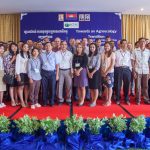
28 downloads
Title of document: Proceedings of the national multi stakeholder workshop on Agroecology Transition, Cambodia Authors: Lucie Reynaud, Pierre Ferrand and Dr Saythong Vilayvong Ministry/Government Agency/Organization: ALiSEA Year of publication: 2016 Geographic focus: Cambodia This report presents the main findings of the discussions held during the 2 days workshop addressing the agroecology transition in Cambodia in Phnom Penh on the 30th and 31st of March 2016. Read More
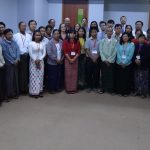
29 downloads
Title of document: Proceedings of the national multi stakeholder workshop on Agroecology Transition, Myanmar Authors: Pierre Ferrand, Dr Htet Kyu and Lucie Reynaud Ministry/Government Agency/Organization: ALiSEA Year of publication: 2016 Geographic focus: Myanmar This report presents the main findings of the discussions held during the 2 days workshop addressing the agroecology transition in Myanmar in Yangon on the 7th and 8th of March 2016. Read More
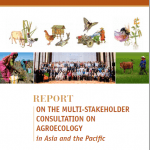
11 downloads
Title of document: Report on the Multi-Stakeholder Consultation on Agroecology in Asia and the Pacific, FAO, Authors: FAO Ministry/Government Agency/Organization: FAO Year of publication: 2016 Geographic focus: Asia and the Pacific Seeking to gain a better understanding of the role that agroecology can play in eradicating hunger and malnutrition, FAO organized the International Symposium on agroecology for Food Security and Nutrition in September 2014 in Rome, Italy, followed by three regional meetings in Asia and the Pacific, sub-Saharan Africa and Latin America and the Caribbean. The Multistakeholder Consultation on agroecology for Asia and the Pacific was held in Bangkok, Thailand on 24-26 November 2015. FAO acted as a facilitator to enable debates and foster collaboration among a variety of actors in order to advance science, knowledge, public policies, programmes and experiences on agroecology, supporting the strengthening of the already-extensive evidence-based knowledge for agroecological approaches in agriculture. The participants in this meeting, representatives of governments, civil society, including peasants, fisherfolks, pastoralists, urban communities, indigenous peoples, women’s organizations, youth and others, academia, and private sector, issued recommendations for the development of agroecology in Asia and the Pacific after two days of discussion. Read More
91 downloads
Title of document: Agroecology Stakeholder Mapping and Situation Review in Cambodia Authors: Proyuth Ly and Samphiron Sar Ministry/Government Agency/Organization: GRET Year of publication: 2016 Geographic focus: Cambodia The current report presented results from a study on agroecology stakeholder mapping and situation review in Cambodia conducted within the framework of AFD’s funded regional project “Toward Agroecology Transition in the Mekong Region”, implemented by GRET. The study is one of the four studies, conducted in parallel in four countries including Cambodia, Lao PDR, Myanmar and Vietnam. The overall objective of the study is to map agroecological initiatives at local and national level and provide a more detailed and accurate account of ongoing initiatives promoting agroecology across the region. The study involves desk reviews including national policy framework, technical reports, articles, books addressing the six identified agroecological practices (SRI, IPM, Organic Agriculture, Integrated Farming, Conservation Agriculture and Agroforestry), interviews with 21 actors actively promoting agro-ecological practices, and field visits to the outstanding sites in four provinces (Kampong Speu, Kandal, Takeo and Siem Reap). The results of the study is divided into five sections: a review of Cambodia’s policy/regulatory frameworks addressing agro-ecological practices, sustainable development, poverty reduction, food security, GI, GAP etc.; status of the six identified agroecological practices and enabling environment; stakeholder mapping and their account of ongoing initiatives; existing networks promoting agroecology; and stories from the fields. Read More
108 downloads
Title of document: Towards an agroecological transition in Southeast Asia: Cultivating diversity and developing synergies Authors: Jean-Christophe CASTELLA; Jean-François KIBLER Organisation: GRET; AFD ABOUT THE STUDY Starting from the early 1990s, a multitude of national and regional initiatives have emerged in the Great Mekong Sub-Region for supporting ecological intensification of agriculture or agroecology. The French Agency for Development (AFD) has been a very active supporter of these initiatives, especially in relation to the promotion of Conservation Agriculture and the establishment of the Conservation Agriculture Network for South East Asia (CANSEA). In addition to its initial focus on Conservation Agriculture and with the objective of widening the scope of agroecology by including all other “schools” such as Organic Agriculture, Agroforestry, Integrated Pest Management, System of Rice Intensification…, the AFD commissioned a study to better understand regional and national agroecology dynamics and initiatives, their strengths and weaknesses as well as the main issues at stake for their large scale dissemination. The authors conducted this study in 2013 in the six countries of the GMS, through a review of the literature combined with country based consultation workshops in Cambodia, Laos, Myanmar and Vietnam and expert surveys in Thailand and Yunnan-China. This publication aims at sharing some of the study’s key findings, and at providing a broad, yet non-exhaustive, overview of the current situation of agroecology in the Great Mekong Region. ABOUT THE AUTHORS Jean-Christophe CASTELLA is a geo-agronomist from IRD, seconded to CIRAD and based in Lao PDR. Over the past two decades, he has worked in the Mekong region on agrarian changes and their impacts on landscapes and livelihoods. Contact: [email protected] Jean-François KIBLER is an agro-economist from GRET with 20 years’ experience in rural development. He has coordinated a number of development projects in Cambodia, Lao PDR and Myanmar. Contact: [email protected] Read More

 Asia & Mekong Region
Asia & Mekong Region  Cambodia
Cambodia  Laos
Laos  Myanmar
Myanmar  Other
Other  Vietnam
Vietnam